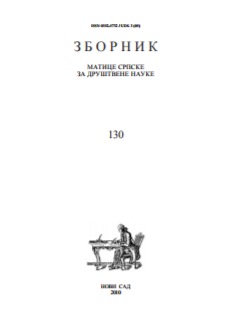RELATIONS BETWEEN THE REPUBLIC OF ARMENIA AND THE ARMENIAN DIASPORA UNDER THE CONDITIONS OF ARMENIAN-TURKISH RAPPROCHEMENT
RELATIONS BETWEEN THE REPUBLIC OF ARMENIA AND THE ARMENIAN DIASPORA UNDER THE CONDITIONS OF ARMENIAN-TURKISH RAPPROCHEMENT
Author(s): S. E. Davtyan, Y. A. BalashovSubject(s): International relations/trade, Migration Studies, Inter-Ethnic Relations
Published by: Матица српска
Keywords: Republic of Armenia; Armenian Diaspora; Turkey; Armenian-Turkish rapprochement;
Summary/Abstract: The Armenian Diaspora (Spyurq) is one of the oldest and skilled diasporas in the world. Armenian communities are present in practically all the corners of the globe and are distinguished both by uncommon abilities of adaptation and the preservation of their cultural specificity. Due to these features, Armenian diasporic communities possess solid development potential, ensuring their high status through an active penetration of Armenians into the elite of the accepting society and a stable character of their communal institutes. Recent Armenian-Turkish rapprochement to some extent brings into question the traditional unity of the Armenian Diaspora and its close relationship with the Republic of Armenia. Representatives of the Spyurq with a negative attitude towards rapprochement between Armenia and Turkey on existing terms can be conditionally divided into three categories: Romanticists (represented mainly by the Union of Armenians of Russia) believe in a certain “mission” of the Armenian nation and the “superiority” of Armenians over the Turkic nations. The Armenian people are, thus, viewed as an integral whole which is not divided into citizens of Armenia and representatives of the Diaspora. Therefore, the government in Yerevan has only a symbolic meaning and has no right to make any crucial decision on all-Armenian issues, in particular in the domain of relations between the Armenian and the Turkish people. Nationalists (mainly supporters of the Dashnaktsutyun party, from the USA and Lebanon, as well as natives of Nagorno-Karabakh and descendants of natives of Western Armenia, which is now Turkish territory) consider the rapprochement of the RA with Turkey as an actual rejection of the struggle for Turkish recognition of the Armenian Genocide, as well as a “betrayal” of Nagorno-Karabakh’s independence. Pragmatists understand international law, political science and history but, in their opinion, the signed Zurich protocols contain weakly reasoned for mulations which are not in accordance with the interests of the RA and are, therefore, inefficient. These formulations 1. do not contain any guarantees of the protocols’ observance on the part of Turkey, 2. recognize the existing configuration of the Armenian-Turkish borders, i.e. symbolize the refusal to return Western Armenia to the Armenian state, and 3. recognize the sovereignty and territorial integrity of the existing states, which translates into a withholding of support for Nagorno-Karabakh, which was a part of AzSSR during the period of the USSR. Besides, Armenian-Turkish rapprochement is interpreted by members of this category as a result of external pressure on Armenia on the part of Russia and the USA. In signing the Zurich protocols, the leadership of the RA was guided, first of all, by the state interests of the RA. The Diaspora factor was in this case secondary, although it was taken into consideration. The split in the Armenian Diaspora, in the authors’ opinion, will be short-lived, because, in the end, pragmatism will prevail.
Journal: Зборник Матице српске за друштвене науке
- Issue Year: 2010
- Issue No: 130
- Page Range: 89-95
- Page Count: 7
- Language: English

